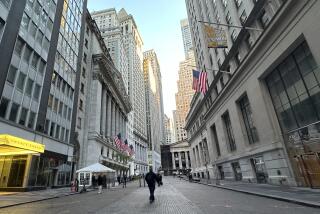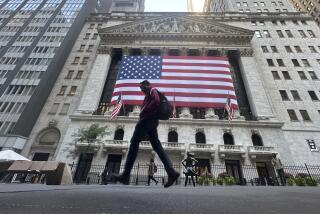Dow Passes 7,500; Yields Edge Higher
The Dow Jones industrial average roared to another milestone Tuesday, giving it a stunning 50% gain in about a year and a half, as stocks staged another record-setting advance.
Bond prices fell as the market had little economic data to trade on.
The Dow rose 60.77 points to pass the 7,500 mark for the first time. The index closed at 7,539.27, its third straight record finish. The broad market turned in a mixed performance, however, with stocks in technology and transportation companies slumping.
Advancing issues outnumbered decliners by a 6-5 margin on the New York Stock Exchange in heavy trading.
The Nasdaq composite index, which on Monday also closed at a record high, fell 10.35 points to 1,401.69. But the Standard & Poor’s 500-stock list rose 2.36 points to 865.27, and the NYSE’s composite index gained 1.59 points to 451.76; it was the third straight record close for both measures.
Just two months ago, the Dow industrials were about 18% lower, besieged by worries about rising inflation and interest rates.
“The market is the news, and it’s telling us that earnings are going to be better in the second half of the year than people were worried about,” said Peter Canelo, U.S. investment strategist at Morgan Stanley, Dean Witter. He noted a report released Tuesday that shows robust retail sales activity last week.
In the bond market, the price of the benchmark 30-year Treasury bond fell, pushing its yield up to 6.84% from 6.82% on Monday.
Analysts said the continuing rally among top-tier stocks reflects a market still awash in cash, although several noted that the source of that cash appears to have changed.
In the past, mutual fund inflows have generally been cited as the key contributor to the stock market’s relentless climb.
Analysts said the rally now appears to be developing an international flavor amid mounting questions over the future of a unified European currency.
Among Tuesday’s highlights:
* Heavy-industry companies, which are dependent on the health of the economy, were among the day’s healthiest groups. The Dow’s strongest issues included 3M, up 1 7/8 to 94 5/8; Caterpillar, up 1 3/4 to 103 5/8; Alcoa, up 1 5/8 to 74 1/2; and Boeing, up 1 1/2 to 57 1/2.
* Technology issues struggled. In Nasdaq trading, Intel fell 4 1/16 to 145 3/1, Dell Computer fell 2 to 110 and Ascend Communications slid 6 1/4 to 41 3/8 after two securities firms issued discouraging comments about the networking company.
Likewise, the weakest Dow issues included computer giants Hewlett-Packard, down 7/8 to 52 1/2, and IBM, down 5/8 to 86 1/4.
Other tech laggards included Cisco Systems, down 1 1/2 to 65; Applied Materials, off 3 5/8 to 60 3/4; Cascade Communications, down 4 5/16 to 28 9/16; KLA-Tencor, down 4 13/16 to 43 1/4; Texas Instruments, down 3 1/4 to 86 1/4; LSI Logic, down 5 1/2 to 33 5/8; and Xilinx, down 3 1/2 to 47 1/16.
* Despite the slight rise in bond yields, banks and other financial issues advanced as investors looked to further consolidation in the industry. NationsBank rose 1 to 64 7/8; Norwest climbed 1/4 to an all-time high of 55 1/4; Bank of New York gained 1 1/8 to 44 5/8, also a record; and Household International jumped 1 1/2 to 102 1/4. Companies seen as acquirers also gained: Citicorp rallied 2 1/2 to 118 3/4, Chase Manhattan rose 2 1/4 to 99 7/8 and First Union rose 1 to 91 3/8.
* Airline issues fell in response to proposed federal legislation that would raise air travel taxes. Delta Air Lines fell 3 3/4 to 88; AMR, American’s parent, dropped 4 5/8 to 94 1/2; UAL dropped 2 to 75 1/4; US Airways Group dropped 1 3/8 to 33 7/8.
More to Read
Inside the business of entertainment
The Wide Shot brings you news, analysis and insights on everything from streaming wars to production — and what it all means for the future.
You may occasionally receive promotional content from the Los Angeles Times.










